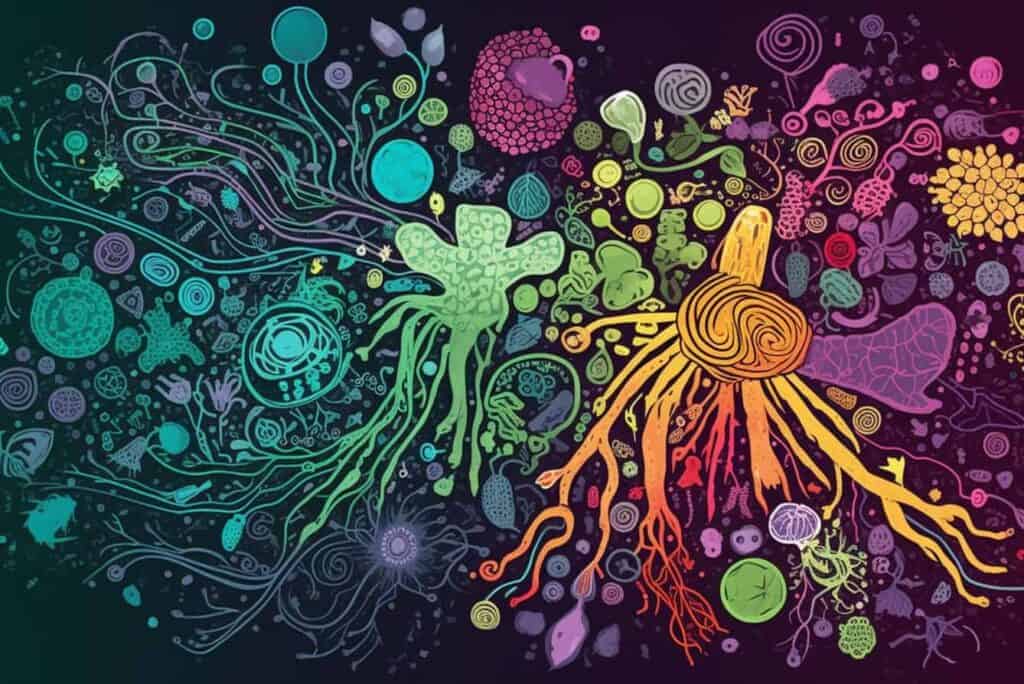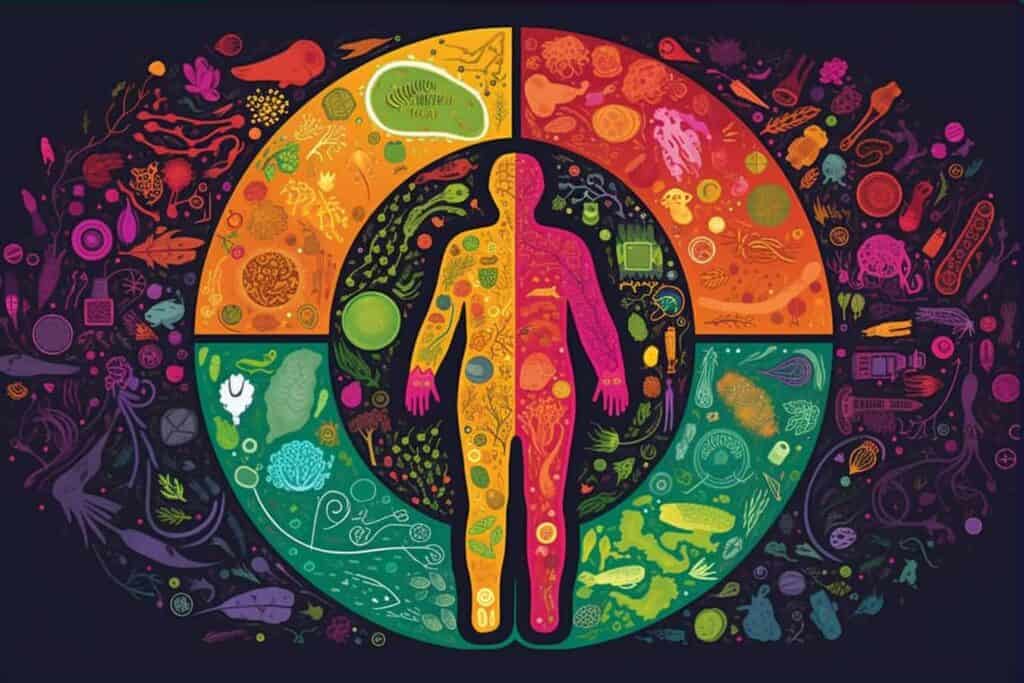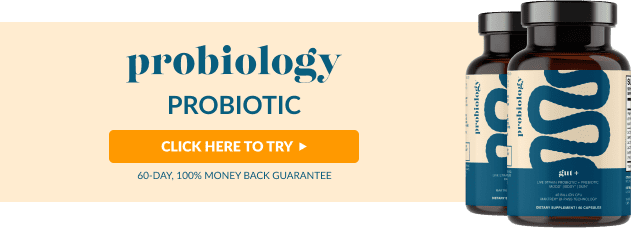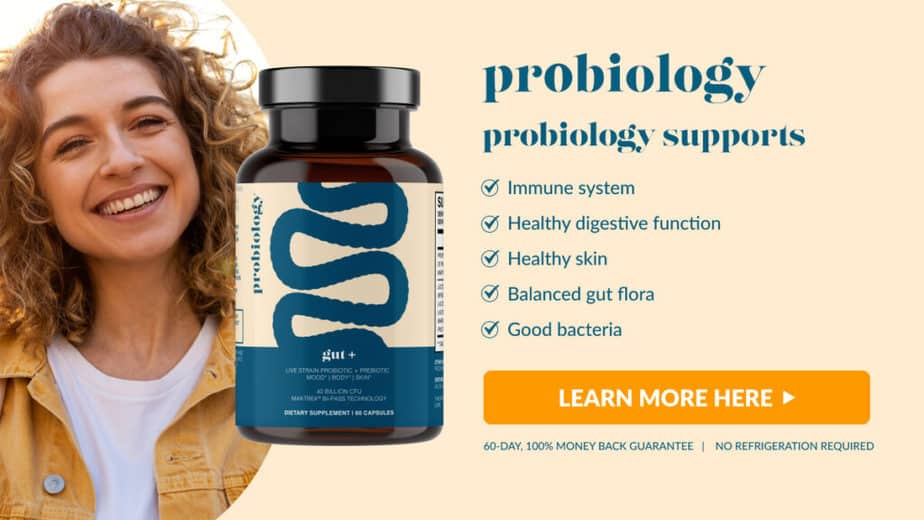Probiotics and prebiotics are two key components to achieving optimal gut health. While these terms are often used interchangeably, there are critical differences between probiotics and prebiotics, both in their function and benefits.
Understanding these distinctions is crucial for anyone looking to improve their gut health or manage specific gastrointestinal conditions.
The topic of gut health is growing in popularity. With an increase in research on how prebiotics and probiotics impact our health, it’s no wonder that they are being talked about more frequently.
Many of us forget that our overall health stems from our gut: it all begins with tiny microbes that live in our gut. Our gut microbiome is home to a wealth of bacteria, some helpful, some harmful.
Many people suffer from chronic illnesses and gastrointestinal problems that all stem from what we are consuming and its impact on the gut flora.
Many neglect to consider what we are putting into our bodies and will fill it with foods high in fat and sugar, all of which work to feed the bad bacteria in our gut. This harmful bacteria is what gives rise to infection, illness, and disease.
An unhappy gut can effectively contribute to increased symptoms of depression, poor sleep, fatigue, and inflammation. Knowing how to manage the health of our gut is of the utmost importance.

With the information we now have, we know how critical it is to ensure and maintain a happy and healthy gut. The secret to improving and regenerating the health of our gut rests on probiotics and prebiotics.
The role of probiotics is to introduce good bacteria to your body, while prebiotics help to nourish and feed the good bacteria that is already in your body.
The following post will go through all the information you need to know about the differences between probiotics and prebiotics and the benefits they have on your gut health and your overall health.
Probiotic vs Prebiotics: What Are the Differences and Benefits?
What Are Probiotics?
Probiotics are living microorganisms that help to improve digestive health by helping to break down food. Probiotics contribute to good gut health by fortifying the population of beneficial microbes in our intestines. These healthy bacteria help us digest food better while keeping harmful pathogens at bay. They also produce vitamins and other nutrients essential for good health.
They offer a range of health benefits and can mostly be found in dairy products. Sources of probiotics include fermented foods such as yogurt, kefir, kimchi, sauerkraut, and kombucha. Additionally, some supplements contain specific strains of beneficial bacteria to help improve gut flora balance.
Many probiotics must be stored in the refrigerator to keep the bacteria alive and free to reproduce. Probiotics only work if they are alive.
They can be easily killed by heat or stomach acid. The problem with probiotics is that they are difficult to process as they tend to denature in the gut before implementing their health benefits.
Probiotics work towards achieving microbial harmony within one’s gastrointestinal system; it is not just about eliminating bad bacteria but also nurturing good ones. Balancing your gut microbiome is critical for optimal wellness as research continues to reveal more information on how the effects of gut microbiome impact overall health.
What Are the Benefits of Probiotics?
Consuming foods with probiotics can help balance out the gut microbiome by introducing good bacteria into the system. Probiotics also aid in breaking down food and absorbing nutrients efficiently, leading to better digestion. Some studies suggest that they may even boost immunity and reduce inflammation throughout the body.
Probiotics serve as micro soldiers in our gut microbiome that contribute toward supporting our overall health. The benefits of probiotics include:
- Promoting a strong immune system
- Promoting weight loss
- Reducing inflammation
- Reducing the symptoms of depression
- Helping to manage the symptoms of illnesses such as IBS or chronic constipation or diarrhea
What Are Prebiotics?
Prebiotics are non-digestible compounds that help to support good bacteria in the gut and work to improve digestion. They serve as fuel for your probiotics. Prebiotic fibers also promote regular bowel movements, which can prevent constipation and other digestive disorders.
Unlike probiotics they cannot be digested by the human body, but instead, they serve as food for probiotic bacteria in your body. Prebiotic sources include fruits like bananas, apples, and berries and vegetables such as garlic, onions, and artichokes. Consuming a variety of these food sources can help support digestive health by promoting the growth of healthy gut bacteria.
Prebiotics derive from carbohydrates, mostly in the form of plant fiber that is known to nourish the good bacteria within your gut, making it healthier.
They too, provide a range of health benefits. Prebiotic fiber can be found in a range of fruits, vegetables, and whole grains. These foods help to support good bacteria to create an environment where good gut bacteria can flourish.
Another key function of prebiotics is their impact on the immune system. Research has suggested that prebiotic fiber consumption can enhance immunity by increasing the number and diversity of beneficial gut bacteria. This effect may help reduce inflammation throughout the body and improve overall immune function.

How Do Prebiotics Work?
The probiotics in your gut consume the prebiotics you consume and ferment them to use as a source of energy.
This process of fermentation creates the release of short chain fatty acids, vitamins, and minerals from the food you have digested.
This process ultimately prevents harmful microorganisms that cause illness from flourishing in your gut and invading your immune system.
What Are the Benefits of Prebiotics?
While the main role of prebiotics is to be a source of fuel for probiotics, without them, we would lose some of the significant benefits that they offer. By consuming prebiotic-rich foods regularly, you can promote growth and diversity of beneficial bacteria while potentially reducing harmful ones.
Prebiotics help to fight against diseases such as IBS, Crohn’s disease, and ulcerative colitis. They benefit the body by helping to improve calcium absorption, process carbohydrates, and support probiotics.
This function enables them to promote the health and strength of the gut wall, regulate blood sugar levels and assist in weight management.
Key Differences Between Probiotics And Prebiotics
To put it simply, probiotics are living microorganisms that reside in our gut and provide numerous health benefits while prebiotics are non-digestible fiber compounds that act as food for these live bacteria to flourish.
To further illustrate this concept, let’s compare probiotics vs prebiotics using a table below:
| Probiotics | Prebiotics |
|---|---|
| Live microorganisms | Non-digestible fiber compounds |
| Found in fermented foods like yogurt and sauerkraut | Found in whole grains, bananas, garlic, onions |
| Can improve digestion, immune function, mental health | Can promote satiety, lower cholesterol levels |
While both probiotics and prebiotics play important roles in maintaining optimal gut health and overall wellness, the question remains: which is more important?
The answer is not so straightforward since they work hand-in-hand to support each other’s functions. However, if one were to choose only one supplement to take daily – probiotic or prebiotic – then it ultimately depends on their personal needs and goals.
How Gut Bacteria Can Be Beneficial?
What Your Gut Does For You?
Your gut’s ecosystem is made up of trillions of different species of bacteria. The gut microbiome aids your body in maintaining a healthy digestive system and a balanced immune system.
Healthy gut bacteria work to break down carbohydrates to help get the energy from it that we need. In doing so, healthy gut bacteria also helps our bodies to fight against infection. It does this by fighting against the negative effects of bad bacteria.
Healthy bacteria within the gut are beneficial in combating health problems such as obesity, diabetes, and cardiovascular disease. It does this by strengthening the wall of the bowel which helps to improve your body’s ability to absorb minerals as well as to regulate and balance hormone production.
Eating unhealthy foods results in an unhealthy microbiome that will increase harmful bacteria that have the potential to worsen various diseases.

Types of Gut Bacteria
Probiotics refer to several strains of beneficial bacteria. There are two prevalent types of probiotic bacteria. These bacteria are classified into two families: Lactobacillus and Bifidobacterium.
The Benefits of Gut Bacteria
Bifidobacterium is a highly effective probiotic that exists in our intestinal flora. This bacterial strain serves to reduce our gut’s pH level while also limiting the bacterial growth of bad bacteria and improving our ability to absorb micronutrients.
Lactobacillus is most commonly found in dairy products such as yogurt. This bacterial strain assists in helping our bodies metabolize sugar to produce lactic acid.
How Food Affects the Gut Microbiota?
The bacteria within your gut are collectively known as gut flora or gut microbiota. This collection of bacteria performs several functions that are of value to the body.
Read on to learn how our diet impacts gut microbiota: the role of nutritious foods and the problem of a bad diet.
Maintaining a healthy diet and eating the right amount of probiotics and prebiotics help to ensure that your level of good bacteria is balanced. Doing so, ultimately contributes to your overall gut microbiota health.
Probiotics and prebiotics can be obtained from a variety of foods. Maintaining a healthy level of good bacteria will protect you against harmful bacteria.
The results will improve your whole immune system and will bring about several health benefits, including improving symptoms of depression, helping to address obesity, and managing gastrointestinal pain and bloating.
The food you eat plays a major role in the balance of beneficial and harmful bacteria that exists in your gut. Having a high sugar and fat intake is harmful as it negatively influences your harmful gut bacteria and could lead to insulin resistance.
Feeding the harmful bacteria will enable them to grow and reproduce. Without enough helpful bacteria, reversing this becomes difficult.
Having more harmful than good bacteria leads to an overall unhealthy gut microbiota. One of the risks of this is having a higher body mass index (BMI).
How Do Prebiotics and Probiotics Work Together?
Using probiotics and prebiotics together is called microbiome therapy. Combining prebiotics and probiotics can help to make your probiotics more effective in improving your gut health.
The combination of probiotics and prebiotics can be highly effective in treating health conditions such as IBS, altered bowel habits, obesity, inflammatory diseases, and the common cold.
Foods containing both prebiotics and probiotics are known as synbiotic foods. Both can be found in dairy and fermented products such as cheese, kefir, and yogurt.
- Related article: Probiotics in Kombucha vs Yogurt
Probiotic Foods vs Prebiotic Foods
Many probiotic foods contain good bacteria. This live bacteria can be found in foods such as yogurt, fermented foods, kefir, kombucha, and pickles. *Note that pasteurized fermented foods don’t contain probiotics as the process kills the bacteria.
Probiotic foods contain live cultures that aid in digestion and promote good bacterial growth within the gut. Incorporating these foods into your regular meal plan is an effortless way to ensure a healthy balance of gut flora.
On the other hand, when it comes to prebiotics there are many food options rich in dietary fiber content. Many foods are naturally rich in prebiotics. While your body cannot digest the fibers contained in prebiotics, the good bacteria in your gut (probiotics) can.
Prebiotic fibers help feed the beneficial bacteria already present in our digestive system naturally! Some of my top recommended foods include garlic, onions & leeks which have fructooligosaccharides (FOS) & Inulin present naturally – two types of soluble fibers known for their pre-biotic effects on friendly bacteria thriving inside us!
Common, popular foods that are rich in prebiotics include whole grains, fruits and vegetables, including bananas, berries, asparagus, legumes, leeks, garlic and so much more.
Other great sources include Jerusalem artichokes – high in insoluble fiber called inulin as well- chicory root or dandelion greens that have more than just vitamins but also act as natural diuretics!
By incorporating both probiotics and prebiotics into your diet regularly through various food choices from each category listed above – you’ll be able to provide your gut with everything it needs for optimal functioning!
A balanced selection may not only leave you feeling better overall but also help reduce inflammation throughout different parts of your body ultimately leading towards longevity & vitality.
- Related article: Kombucha and IBS
Should I Be Taking Prebiotic Supplements?
When should you start thinking about taking prebiotic supplements?
Our gut needs help to digest prebiotic fibers such as those found in legumes and apple skin. We need these prebiotic fibers to maintain a healthy and happy gut with good bacterial activity.
Consuming prebiotics in the form of supplements can do this.

Symptoms of Poor Gut Bacterial Health:
Most of the bacteria in our body spend their time in our colon. The microorganisms that live in the colon are known as probiotics, and they largely impact our mental and physical health.
Looks for these signs and symptoms that you may have poor gut bacterial health:
- Abdominal bloating
- Abdominal pain and discomfort
- Diarrhea
- Excess gas
- Brain fog and poor cognition
- Increased cravings
The amount and type of bacteria that nourish our gut have a strong impact on everything from our mental health, our immune system, and even our weight and sleep patterns. Having a poor diet greatly impacts our microbiota by putting it under stress.
One way to improve the diversity of our gut microbiota is to change the way we eat. In order to maintain a healthy microbiome there are two things you need to do.
The first is to feed the microbes in your gut with the food they need to grow and flourish (prebiotics) and the second is to add living microbes directly to your diet (probiotics).
Things To Consider Before You Start Taking Supplements
Remember that probiotics are living organisms. So, if you do decide to start taking probiotic supplements make sure you double-check whether they need to be kept in the fridge or not – several need to be kept in cooler temperatures as heat can kill them. The last thing you want is to be taking an ineffective probiotic.
Temperature storage isn’t something that you need to worry about if you are taking prebiotics.
It’s advised that if you are taking a course of antibiotics, you wait until you have finished your treatment. While antibiotics are designed to kill the harmful bacteria that has caused an infection, they can also kill the good bacteria in your gut, so the probiotics may also be killed.
It may be better to wait until your course of treatment is finished and your body’s bacteria have repopulated before starting probiotics.
Different probiotic supplements are designed to tackle different health problems and so are made with varied strains of bacteria to repopulate your gut.
So, it’s worth doing extra research to double-check that the supplement you are going to take is going to address the problems that you are facing. You can even talk to your physician or nutritionist just to make sure that you find the right one for you.
Keep an eye on a couple of the good gut bacteria strains in supplements:Lactobacillus and Bifidobacterium. These are good options:
- Probiology Probiotic + Prebiotic Capsules
- Align Probiotic Capsules
- Culturelle Probiotics Capsules
- Activia Probiotic Yogurt (Related article: Is Activia Good for IBS?)

How To Get the Most Out of Both Prebiotics and Probiotics
Synbiotics are foods, including most dairy products such as cheese and kefir, that contain the best of prebiotics and probiotics and are great for getting the most effective health benefits from probiotics and prebiotics.
This powerful combination contains probiotic bacteria and a prebiotic fiber which work together to restore the health of your gut.
The way that synbiotics work is by encouraging the two to work together to increase the number of established probiotic bacteria in the gut by fueling them with prebiotics as a sustainable source of energy. The combined benefits of synbiotics have a great positive effect on overall gut flora.
Here are a few ways to make sure that you are getting the most out of your prebiotic and probiotic supplements:
- Make sure that you use the right probiotic supplement for your health concern.
- Make sure you read the labels carefully and follow the correct dosage instructions.
- Make sure you store your supplements in the correct location.
- Throw away your probiotics if they have exceeded their expiration date.
- Allow time for your supplements to take effect.
Common pitfalls to avoid:
- Leaving probiotics in a warm environment where they are likely to die.
- Stopping your probiotics before it has a chance to take effect.
- Taking the wrong probiotic or prebiotic supplement for addressing your concerns.
- Taking your supplements at the wrong time of day.
Read more about When is the Best Time to Take Probiotics.
Probiotics vs Prebiotics Final Thoughts
You now have all the information you need to understand the difference between probiotics and prebiotics. With the information given of where you can find natural sources of the two, you will now be able to effectively incorporate them into your diet to promote a healthy gut microbiome.
This post has also provided you with a heap of information on the benefits of both probiotics and prebiotics, and how they work together. You now have all the information you need to maintain a happy and healthy gut!

Here are some other articles on prebiotics and probiotics that are helpful:
- Taking Prebiotics and Probiotics Together
- Are the Probiotics Working?
- Does Probiotics Help With Constipation
- Do Probiotics Make You Poop
- Best Prebiotic for Weight Loss
Probiotics vs Prebiotics FAQs
Can Probiotics And Prebiotics Be Harmful If Taken In Excess?
Both probiotics and prebiotics have potential dangers if taken in excess. While they are generally safe for most people when consumed within the recommended dosage, excessive consumption can lead to gastrointestinal discomfort such as bloating, gas, diarrhea or constipation.
Additionally, individuals with weakened immune systems or serious medical conditions should consult their physician before taking them.
It is crucial to understand that while these supplements may offer benefits to gut health and overall well-being, moderation is key to avoid any adverse effects.
Are There Any Side Effects Of Taking Probiotics And Prebiotics?
Shile probiotics and prebiotics can provide numerous benefits for digestive health, there are also potential drawbacks associated with taking them.
One concern is the long-term effects of consuming these supplements. While some studies have shown positive results in terms of improved gut health and immune function, other research suggests that excessive intake may negatively impact microbial diversity in the gut over time.
Additionally, certain individuals may experience side effects such as bloating or diarrhea when first introducing these supplements into their diet. As with any supplement or dietary change, it’s best to consult with a healthcare provider before beginning regular use to ensure safety and effectiveness.
For those seeking control over their digestive health, incorporating probiotics and prebiotics into a balanced diet under medical supervision may prove beneficial.
Can Probiotics And Prebiotics Help With Weight Loss?
The gut microbiome plays a crucial role in maintaining metabolic health and proper functioning of the digestive system.
Probiotics and prebiotics have been studied extensively for their potential to promote weight loss by modulating the composition of gut bacteria, improving insulin sensitivity, and reducing inflammation.
While some studies suggest that probiotics may be useful in aiding with weight loss, further research is needed to confirm these findings.
Similarly, prebiotic supplementation has shown promise in promoting healthy digestion and immune function but more rigorous trials are necessary to establish its efficacy as a weight-loss aid.
Can Probiotics And Prebiotics Help With Mental Health Issues?
The impact of probiotics and prebiotics on the gut-brain axis has been a topic of increasing interest in recent years.
The role of the gut microbiome in mental health is complex, with studies suggesting that imbalances or dysbiosis within this ecosystem may contribute to conditions including anxiety, depression, and even neurodegenerative disorders such as Alzheimer’s disease.
While research into the specific effects of probiotic and prebiotic interventions on mental health outcomes is still emerging, there is evidence to suggest that these supplements may help restore balance to the intestinal environment and support overall well-being.
It’s important for patients to understand the potential benefits of proactive management of their gut microbiome through dietary interventions like probiotics and prebiotics.
By taking control of their digestive health, individuals may be able to positively influence not just their physical wellness but also their cognitive function and emotional resilience.
Sources:
- https://ods.od.nih.gov/factsheets/Probiotics-HealthProfessional/
- https://ods.od.nih.gov/factsheets/Probiotics-Consumer/
- https://www.nccih.nih.gov/health/probiotics-what-you-need-to-know
- https://www.health.harvard.edu/nutrition/understanding-the-health-benefits-of-taking-probiotics
- https://www.health.harvard.edu/digestive-health/benefits-of-probiotic-foods-using-good-bacteria-for-better-health
- https://www.canr.msu.edu/news/probiotics-prebiotics-foods
- https://www.umassmed.edu/nutrition/ibd/ask-Nutritionist/prebiotics-what-where-and-how-to-get-them/



